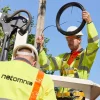IoD Seeks Solid Switch Off Date for UK Copper Telecoms Network
Last week the UK Government proposed an industry led “switchover” process to remove the old copper line (broadband and phone) telecoms network as “full fibre” (FTTP/H) is deployed, but it stopped short of setting a full switch-off date. Now the Institute of Directors has called for a solid date, possibly as early as 2025.
Openreach have already said that they want to switch-off and migrate customers from their old copper network gradually, as their new 1Gbps capable Fibre-to-the-Premises (FTTP) network is deployed because this will save money and thus make the “full fibre” investment case more attractive. At the same time they’ll also be withdrawing old voice (phone / PSTN) services more generally across their copper network by 2025 (here).
However physically retiring the copper network itself is going to be complex (see here) and could raise competition concerns from ISPs that have invested heavily in it (e.g. TalkTalk, Sky Broadband). Consumers may also be asked to pay more for the FTTP line and will need new phone adapters, which won’t be welcomed by everybody.
Advertisement
The situation will be significantly easier in Hull (East Yorkshire), where KCOM has few competitors to worry about and will have already covered the area with FTTP/H by March 2019. We expect KCOM to be the first out of the gate when it comes to the near total withdrawal of their old copper line network.
The Government’s Position
Last week the Government, which has already set an as yet unfunded aspiration to cover the entire country in “full fibre” connectivity by 2033, proposed to adopt an industry led switchover (from copper to full fibre) coordinated with Ofcom (here).
The timing for all this will be dependent on both the pace of rollout of the new fibre optic networks, and on the take-up of those networks, although the report also indicated how it is realistic to assume that switchover could happen in the majority of the country by 2030.
However the IoD, which represents around 35,000 business leaders, has called on the Government to set a much sooner and firmer date of 2025 “or soon after“.
Advertisement
Dan Lewis, IoD Senior Advisor for Infrastructure, said:
“With an ever-changing world of work, business should be looking to enable employees to work flexibly. Unfortunately, firms are paying the price for the neglect of full fibre connectivity. We are jogging while the rest of the world is sprinting. We need a copper switch-off date of 2025 or soon after.
Where you live should not determine your ability to work, or even start a business, with flexibility. The internet should be creating a more level playing field for businesses regardless of location, but uneven broadband coverage means the opposite is true.”
We assume from this that the IoD would expect the entire country to be completely covered by FTTP/H come 2025, otherwise such an early switch-off date would result in those still stuck on copper lines being effectively left without any fixed line connectivity. This would also require operators to collectively deliver something like 4-5 Million premises passed per year, which does not currently seem particularly feasible.
Full fibre networks are inherently very slow to deploy due to elements such as the high cost of labour, as well as issues with a shortage of the optimal machinery/skills, delays with planning/permit/admin/power supply and the sheer amount of invasive civil engineering (street works) involved.
Looking across the EU this is all fairly normal. Outside of large communist states where labour is cheap and plentiful, FTTP/H will always take a very long time to deliver.
Image credit to AAISP.
Advertisement
Mark is a professional technology writer, IT consultant and computer engineer from Dorset (England), he also founded ISPreview in 1999 and enjoys analysing the latest telecoms and broadband developments. Find me on X (Twitter), Mastodon, Facebook, BlueSky, Threads.net and Linkedin.
« Full Fibre UK ISP Hyperoptic Discount Ultrafast Broadband Prices
Openreach Trial New 1Gbps Street Access Ethernet Product »
















































Comments are closed